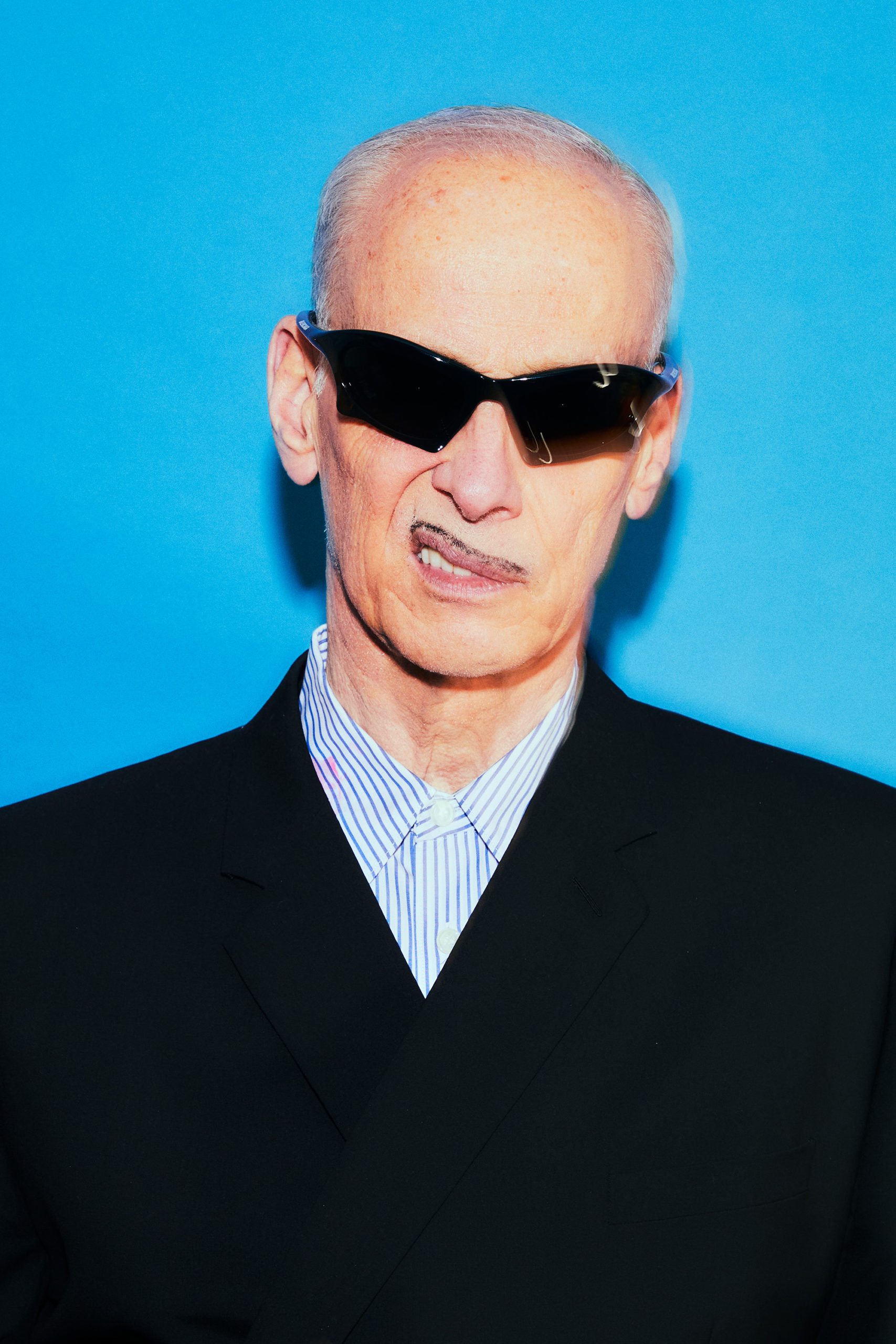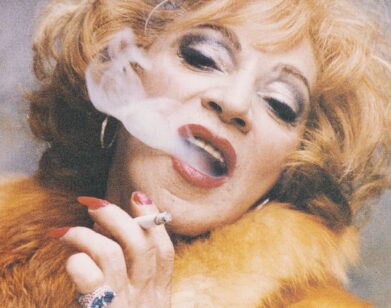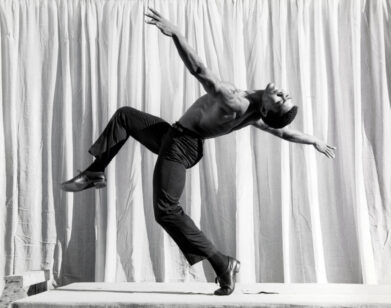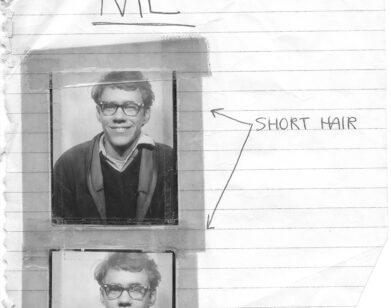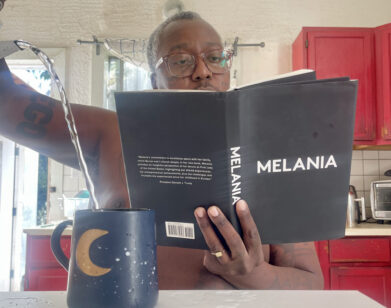Icon
John Waters and Brontez Purnell on Dirt, Scams, and Sensitivity Readers
John Waters is so wickedly prolific, it seems shocking that only now can he add “debut novelist” to his list of creative vocations. Already, of course, the Pope of Trash and King of Filth is a beloved film director, screenwriter, artist, photographer, essayist, performer-speaker, comic, professional wit, and all-around national gay treasure. Just this year, his masterpiece of dirty-minded arthouse cinema, Pink Flamingos, celebrated its 50th anniversary. At age 76, Waters continues to live in his hometown of Baltimore, the backdrop for many of his films, and travel the world on his speaking tours. But alongside the seemingly endless deviant energy, Waters proves to be a disciplined artist, writing every morning. It was from this habit that his first novel, Liarmouth: A Feel-Bad Romance, sprang to life. It’s a wild-child of a book that could only come from that great father of monster misfits. This past spring, the San Francisco writer Brontez Purnell, also known to stir up trouble, spoke to the divine legend about making art, how he wants to be remembered, and whether he’d rather hang out in Warhol’s Factory or with the Cockettes.
———
BRONTEZ PURNELL: Okay, we’re supposed to talk and have a good time!
JOHN WATERS: I always hate when you’re on a TV show or something and the director says, “Just have fun with it!” Fun is when it’s over, and you’re off work.
PURNELL: I know, it’s like, who actually wants to bust a nut on camera? It’s so hard.
WATERS: I guess porn stars do.
PURNELL: How have you been? I haven’t seen you since the Meltdown.
WATERS: Well, I did an 18-city Christmas tour and lived to talk about it. I just made it through before the new virus broke out. And I just came back from London. It’s shocking what it’s like there. It was like the day after World War II. I felt like a soldier was going to grab me and kiss me backwards like in that famous picture. The streets are filled with people. I’ve never seen London streets more packed in my life.
PURNELL: You’re such a showgirl. You have a real, old-Hollywood commitment to showing up and being there. The show must go on, no matter what.
WATERS: Well, it does have to go on. It’s also how I make my living. It was good to be back on the road, that way you stay in touch with your audience. I’m going to go do a book tour, too, but god knows what that’s going to be like. Am I going to actually sit somewhere and sign books? Am I going to have a protective shield, like a dental dam I have to talk through to meet people?
PURNELL: This is your first fiction book, right?
WATERS: It’s my first novel. I’ve written 16 movies, and they were all fiction. And for Carsick [Waters’s 2014 quasi-memoir], the first two thirds of the book were fiction in terms of me imagining the best and worst hitchhiking rides, but that’s different because I was a character in it. When it’s a novel, maybe you’re every character, but John Waters himself is not in the book. So, it is definitely my first novel, and it’s in some ways like writing a movie, because it’s got plot and characters. The difference is you don’t have to tell the story with dialogue.
PURNELL: Was it harder to write a novel as opposed to a movie?
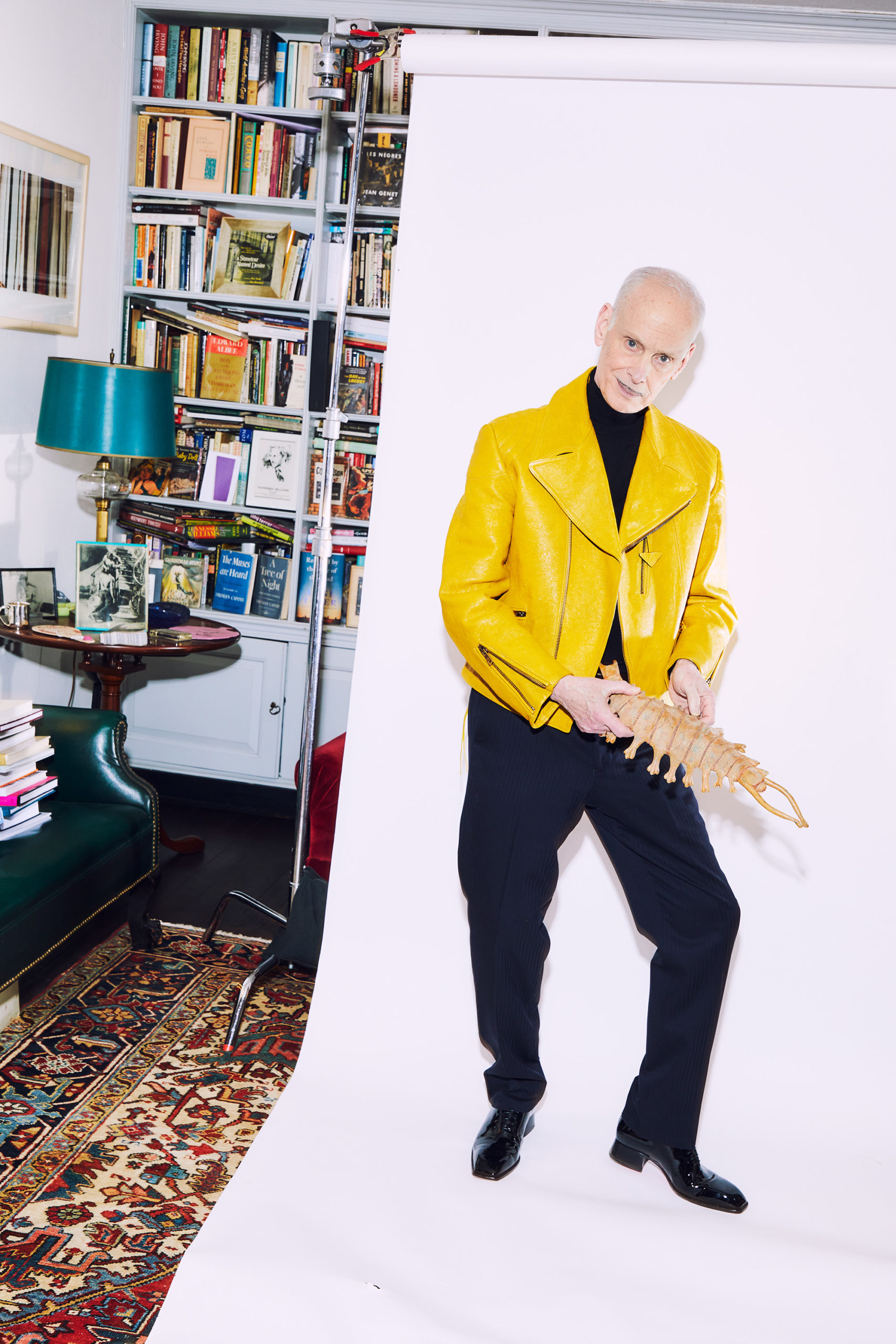
Jacket, Shirt, Pants, and Belt by Prada. Shoes by Christian Louboutin.
WATERS: They’re the exact same thing. I go in my writing room at 8 a.m. every morning and do it. I get out my legal pads, my Bic pens, my clear Scotch tape, my scissors, and I start the first draft. Now, with Liarmouth, I thought it up first and outlined it and pitched it to my editor. And the one question he asked, which I thought was very telling, was, “Do you know the end?” And I did. But things change so much when you’re writing. I write a full first draft, and then when I’m finished, I read it and think, “Who wrote this? What is this?” Then I start rewriting, and that’s when, if it’s ever going to get good, it does, and I never turn in anything except my fifth draft. Now they have this dreaded thing called a “sensitivity reader,” which is tough to imagine on this book. But we did go through it and try to think of ways to say things that were politically correct that made it even more ludicrous, because this book does make fun of political correctness. Although I think I am politically correct, in a weird twisted way.
PURNELL: I think you’re the most politically correct! It has always been explained to me that language shapes behavior. And I definitely think you’ve always been excellent at that. Let me ask you, how did you keep yourself from dreaming of this novel cinematically? I know when I’m writing, I’m always dreaming cinematically.
WATERS: Let’s just say in the very beginning, maybe this was a film idea, and it never happened, but I thought, “I know this, I like the title, and I like the character.” It would really be funny if the novel comes out and someone wants to adapt it; they’d have to make a movie deal with me to make me do my own novel. Which would be the perfect business scam.
PURNELL: How long did it take you to write this book?
WATERS: Three years. And I always do the same thing. On the first day, I take a Polaroid of an empty pad, and then I take a Polaroid of the first draft, and then I take a Polaroid of when I turn it in. We used to have a ritual in my office that whenever we turned in a project, I always made my staff lick the envelope, but I guess today we can’t do that anymore. We didn’t do that with this one, because it’s done by computer, but we maybe licked the computer when we sent it in. Those are just rituals to put a good vibe on it when you send in a new project, because you think, “What are they going to say?” You have no idea after you’ve been working on it for three years.
PURNELL: To get writing done, is it better for you to go off somewhere, or do you prefer to be at home?
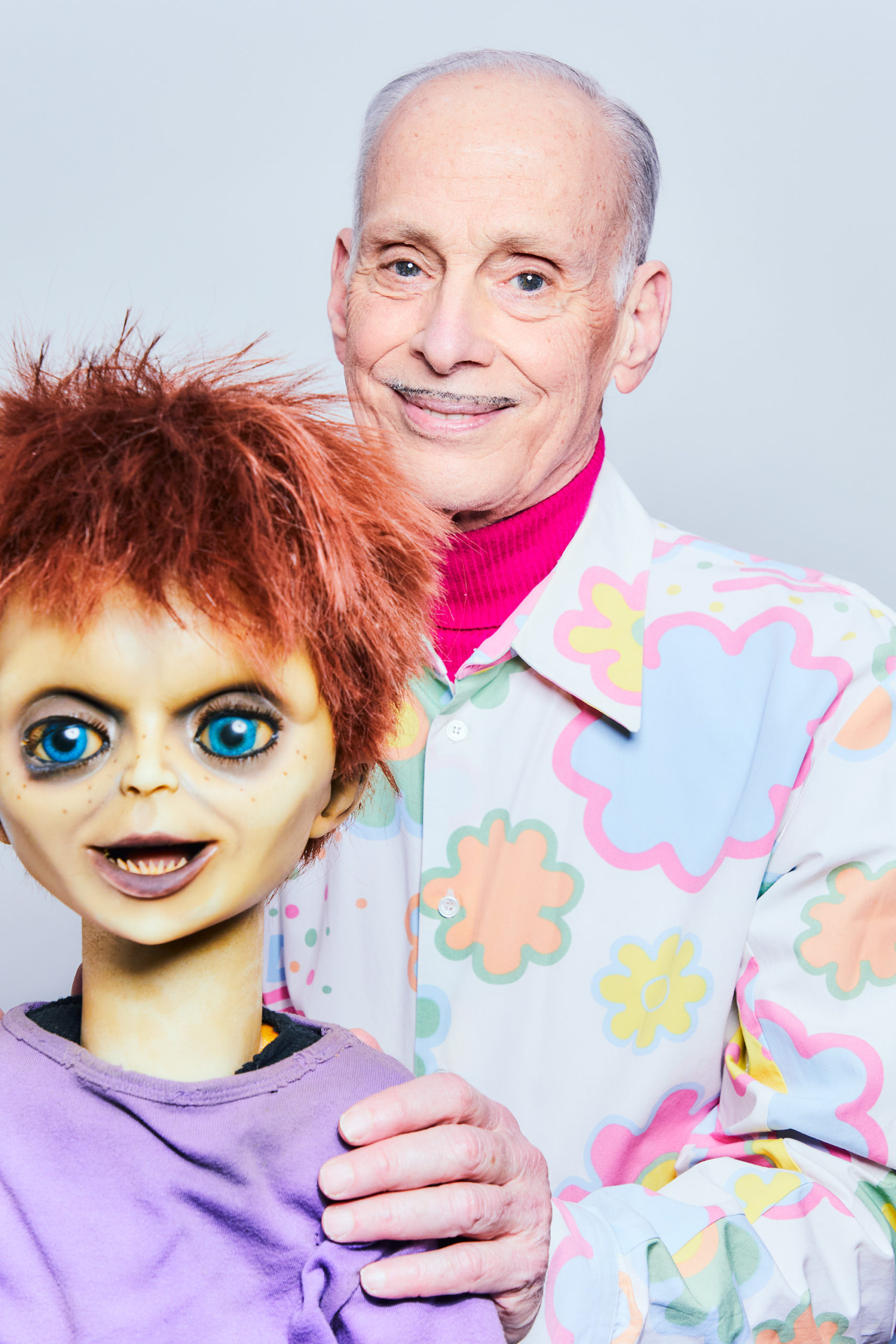
Shirt John’s Own. Turtleneck by Louis Vuitton Men’s.
WATERS: I have one room in every place I live in. I have my house in Baltimore, I have an apartment in New York, one in San Francisco, and one in Provincetown that I rent. It’s all the same. I have a place where I write, Monday to Friday. Sometimes when I’m traveling, if I’m doing shows, I’ll book the flights so I can write in the morning in the hotel room. I can write anywhere if I’m by myself, and I get up at six to get ready, and write at eight. I try to never miss a day.
PURNELL: Where do you think up all your ideas?
WATERS: I do dream when I’m writing, and sometimes I think I’ve figured out a really good plot twist. So I’ll wake up and write it down on a pad in the middle of the night, and then the next morning when I read it, it makes absolutely no sense.
PURNELL: I love shit like that, just keeping journals and unlocking weird headspaces.
WATERS: I have lots of cubbyholes. I have pads of paper everywhere in my house. It sounds like a bad Woody Allen movie, but I have different cubbyholes. So one’s for the book, one’s for the Christmas show or an art idea. I have pads in the car and everything. I’m always thinking of ideas. Sometimes they work, sometimes they don’t.
PURNELL: There’s something to be said for a strong work ethic. I went to UC Berkeley for art, and the professors were always trying to teach us that being an artist was more of an embodied practice of work. I think a lot of young writers today write a poetry volume and then a chapbook and then they’ll be like, “Where’s my check? I’m sick of laboring so hard.” But older-school authors treat work in a much more ingrained way.
WATERS: People always say to me, “How do you have the discipline?” Well, easy. Otherwise I’d have to go get a job and work for somebody else. It’s not hard to be motivated to do it, because I can go to work in my underpants in the other room if I feel like it. But I know what you mean. At 7:59 a.m. every morning, I think, “I’ve got to clean the stove, I’ve got to do anything to not go in there.” But everybody in the world who knows me knows not to call me in the morning. I don’t see my emails in the morning and I never answer the phone. I just have to go into that room and get sucked into that little mental world. You make some progress every day; I never just sit there and stare at a blank pad. I’ve spent a week on something that’s a terrible idea and then I’ll get rid of it, but I never just sit there stumped. I can always think up ideas. Maybe they’re not always good, but I can think them up.
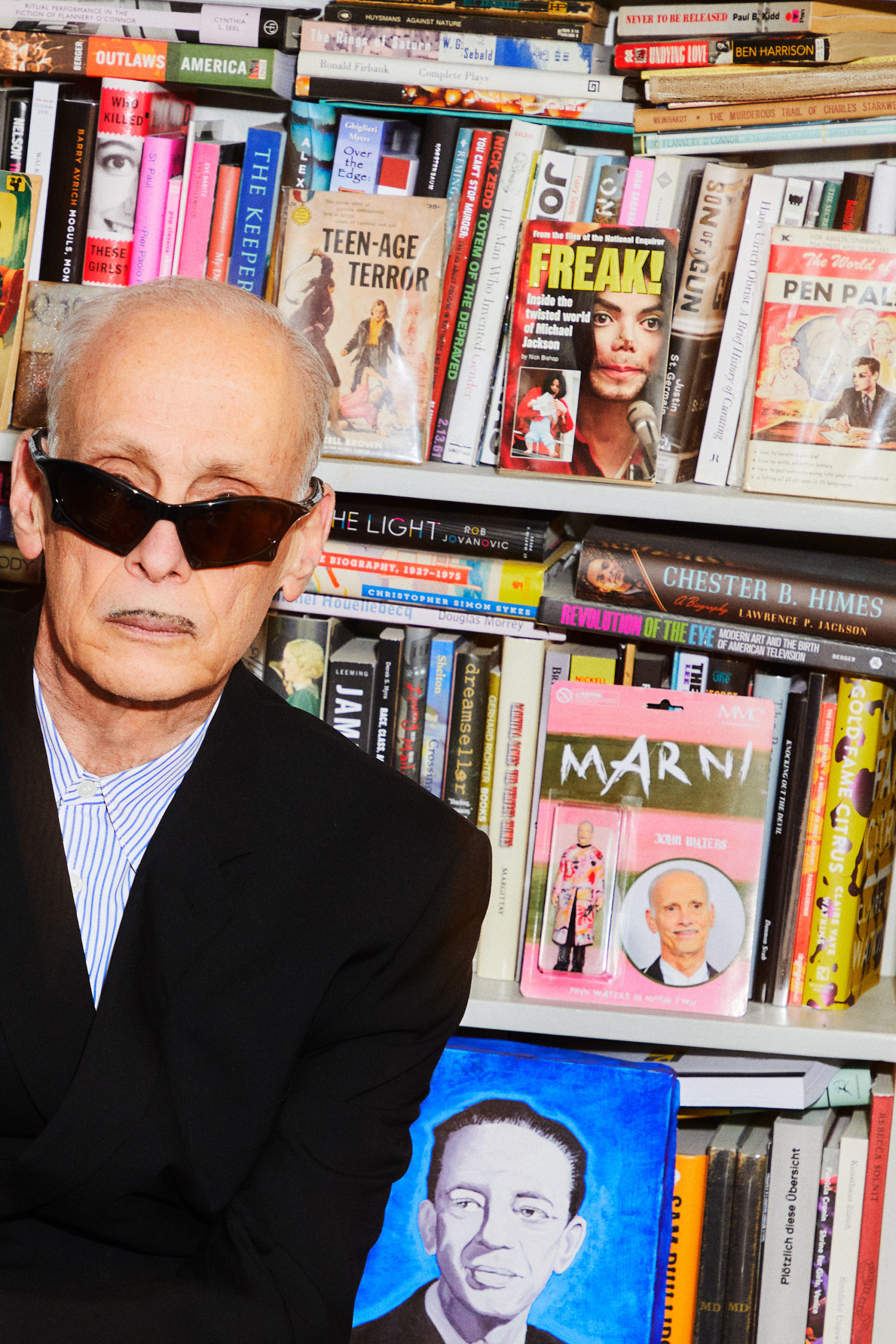
Blazer by Dior Men. Shirt John’s Own.
PURNELL: Do you ever do stream-of-consciousness free writing that doesn’t necessarily go anywhere?
WATERS: No. If I’m going to write something, I don’t waste it. If I’ve written something that gets cut out of a book, I’ll recycle it in a spoken-word show or I’ll put it somewhere else. I might use it ten years later, but it gets used.
PURNELL: You use every part of that goddamn pig! Let me ask you, I think in our current film and literature climate, things like absurdity, irony, and satire have been weaponized against us by every side. They used to be the tools that transgressive writers used, but now the whole world has access to them. Do you think they’re still effective in today’s culture?
WATERS: I’m just trying to make people laugh, and by doing that, it’s political. If you can make people laugh, no matter what their politics are, no matter what their sexuality is, they’ll listen to you. So in Liarmouth, it’s purposely over-the-top, it’s purposely crazy, it’s about an unlikeable woman. It’s subtitled, “The feel-bad romance.” I want it to be feel-bad in a funny way, because I’m hoping you’re laughing as you read. It’s preposterous. It all happens in five days, and if all that happened in real life in five days, people would die of exhaustion. I’m overboard on plot, overboard on characters and how they behave, but I also know my characters well because I live with them. I started as a puppeteer as a kid, and in a way, it’s still like that.
PURNELL: Who are your literary heroes?
WATERS: Oh, easy. When I grew up, Tennessee Williams and Jean Genet were the two that had the biggest influence on me. But Grove Press saved my life, and all those books that came out, Theater of the Absurd, Marquis de Sade, and Marguerite Duras, all that kind of stuff, is what kept me going. Denton Welch is my favorite writer. And I love Jane Bowles. I think Two Serious Ladies is the best novel ever written. So my role models are people that used humor in a twisted way, and invented their own style.
PURNELL: I totally vibe with that. I reconnected with Tennessee Williams recently. There was a movie I loved as a child that I never knew was based on a play of his called This Property Is Condemned. I’ve been watching it a lot lately.
WATERS: With Natalie Wood, right? Tennessee Williams is still great. I wrote the introduction to his memoirs, which was a chapter in my book Role Models. Tennessee still has the best titles of anybody in the world.
PURNELL: Do you ever write poetry?
WATERS: No! If someone else wants to call what I write poetry I would be complimented, but I certainly wouldn’t call it that. I’m a modest person.
PURNELL: [Laughs] John! You are not!
WATERS: I am! Why do you think I called my films trash? And I called myself a filth elder. That’s not bragging!
PURNELL: Well, you can brag. This is for Interview. How do you feel about Interview?
WATERS: Interview is pretty amazing. I remember how excited Divine was when he was on the cover when Andy had it, in February 1988. Divine was so pleased by that.
PURNELL: How do you feel about the change in older art institutions and the way the world is opening up?
WATERS: I got thrown out of every school I went to, practically, so not one person who has ever paid me a check has asked me if I went to school. It’s very different today. When I went to school, my interests were discouraged. I was punished for reading the kind of books I read. But today, it’s completely different. Today, it’s a better atmosphere if you have a creative child. But I taught in prison for a long time. If I was ever going to be a teacher, it would be in prison, not in the university.
PURNELL: Do you think you’ll go back to working in film again?
WATERS: Oh, sure! I’m in the middle of a couple deals that might happen. I’ve been paid to write three movies that were never made, different Hairspray sequels. Hollywood’s been fair to me, and I still deal with them all the time, so I have no complaints. I’ve had a good show business career.
PURNELL: The versatility of your career is so inspiring.
WATERS: People say to me, “Aren’t you ever going to retire?” I say, “I’d drop dead if I retire. I’ve never been this busy in my whole life.” So yeah, I need to tell stories. I wake up every day, and I have to tell a story somehow. I constantly eavesdrop, ask people questions, drive people crazy, because I always want to know what they feel, and that’s what you have to be if you’re going to be a writer.
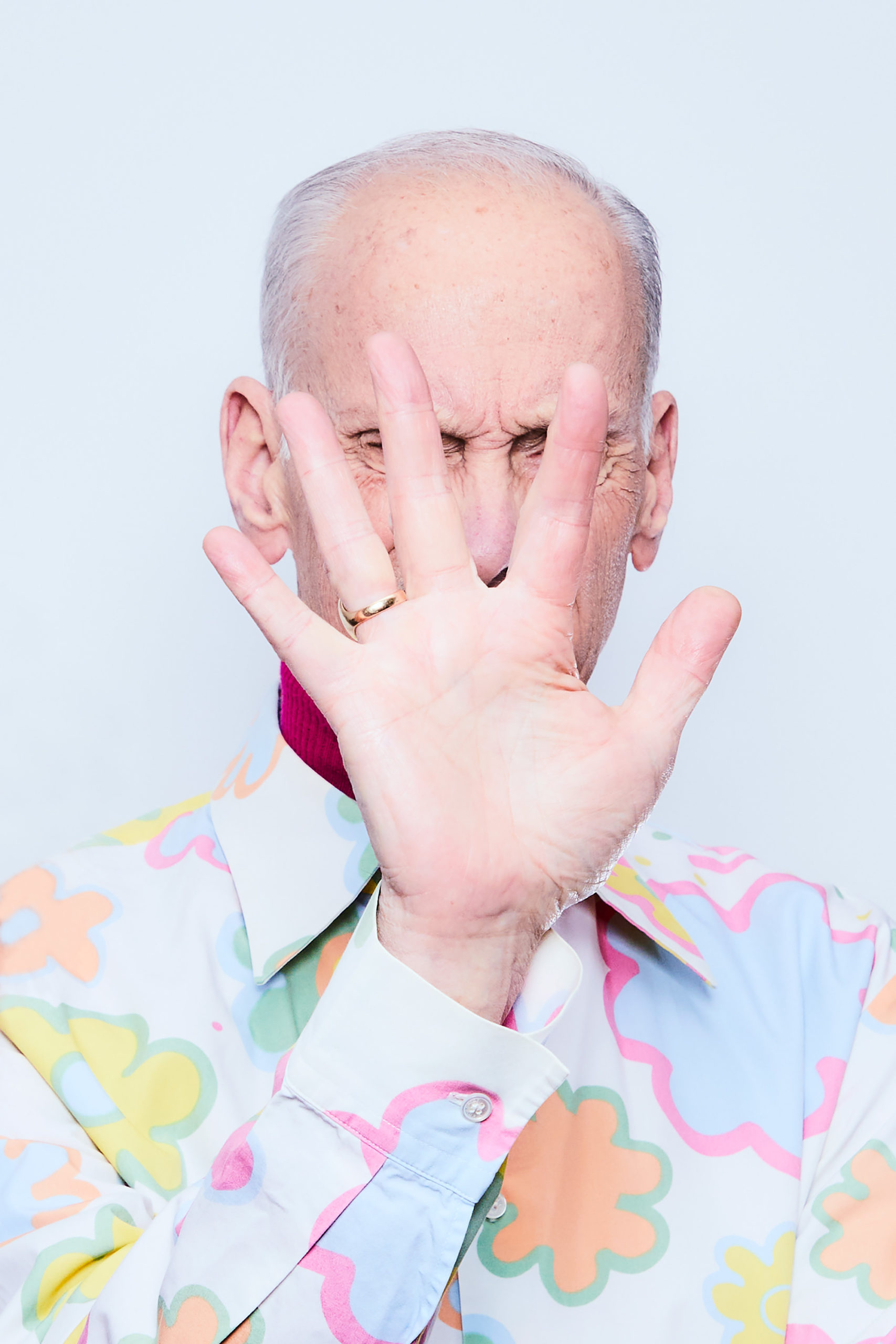
Shirt and Ring John’s Own. Turtleneck by Louis Vuitton Men’s.
PURNELL: What would a person have to do to get a private nighttime phone call from John Waters?
WATERS: That’s probably something I’d do in an auction—you know, where I’d call and for the phone sex I’d read the dirtiest parts of the book or something. But I’d save that for a charity auction.
PURNELL: Let me into that auction right now!
WATERS: There is a dirty part in Liarmouth, the most ludicrous sex scene, and I guess I’m going to have to read it for the audio book. There are always certain parts in a book that sound worse read aloud than when they’re written. And for those parts, I always look up at the studio technician and think, “Oh my god, what are they thinking?”
PURNELL: If you had to choose between hanging out with the Factory kids or the Cockettes, who would you rather? When I think of the Factory, I think of doing meth and being very stylish, which I find appealing. But when I think of being a Cockette, I think of being on a lot of acid in a vintage MGM outfit, which I find equally appealing. Which do you lean towards?
WATERS: I would probably hang out with the Factory kids, even though today I also hang around with some of the Cockette survivors. In the old days, we made fun of hippies, and the Cockettes were definitely hippies. But they were really radical ones. If I had to choose, I would hang around with Rotten Rita, who was the nastiest, craziest amphetamine dealer at the Factory who supplied Brigid and Ondine and all of them. So I would go deeper, deeper, deeper into the scariest part of the Factory.
PURNELL: My daddy who lives in the Castro is 80 years old, and he was a gay hippie in San Francisco in the ’60s. He is rather insistent on the notion that you shouldn’t trust any Boomer that’s still alive— all the coolest ones died in the ’70s and ’80s. Do you agree with this take or find it totally fucking harsh?
WATERS: Old people who tell young people what to do only prove they’re old. In my opinion, some of the stupidest people are dead, like the ones who refused to stop doing drugs. But at the same time, life is not fair, and I do not believe in karma. I do understand what your father means. Like, why is Divine dead and Trump alive? But life isn’t fair. I learned that a long, long time ago. So I don’t think the good die young or old within any reasonable pattern.
PURNELL: John, how do you stay so stylishly thin? Genetics?
WATERS: I’m not that stylishly thin. I weigh myself every Friday when I weigh the least, because I try to eat sensibly Monday to Friday. I weigh the most on Monday morning because I eat not-so-sensibly on weekends. Yes, I’m not from a big-boned family. I don’t have a glandular problem. But at the same time, I do have to watch my weight.
PURNELL: Last question. Would you rather be remembered for your art or your work ethic?
WATERS: I never call what I do art. I’m humbler than that. That’s for others to decide. But if I can choose, I want to be remembered for my writing because every part of my career, from movies to books to spoken-word shows to my artistic career in art galleries, is based on thinking up an idea and writing it down. That’s how I hope I’ll be remembered.
———
Grooming: Laramie using Clinique and Oribe / Day One
Photography Assistant: Jeremy Gould
Fashion Assistant: Sofia Amaral

